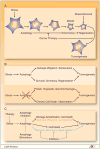The double-edged sword of autophagy modulation in cancer
- PMID: 19706824
- PMCID: PMC2737083
- DOI: 10.1158/1078-0432.CCR-07-5023
The double-edged sword of autophagy modulation in cancer
Abstract
Macroautophagy (autophagy) is a lysosomal degradation pathway for the breakdown of intracellular proteins and organelles. Although constitutive autophagy is a homeostatic mechanism for intracellular recycling and metabolic regulation, autophagy is also stress responsive, in which it is important for the removal of damaged proteins and organelles. Autophagy thereby confers stress tolerance, limits damage, and sustains viability under adverse conditions. Autophagy is a tumor-suppression mechanism, yet it enables tumor cell survival in stress. Reconciling how loss of a prosurvival function can promote tumorigenesis, emerging evidence suggests that preservation of cellular fitness by autophagy may be key to tumor suppression. As autophagy is such a fundamental process, establishing how the functional status of autophagy influences tumorigenesis and treatment response is important. This is especially critical as many current cancer therapeutics activate autophagy. Therefore, efforts to understand and modulate the autophagy pathway will provide new approaches to cancer therapy and prevention.
Figures

References
-
- Hanahan D, Weinberg RA. The hallmarks of cancer. Cell. 2000;100:57–70. - PubMed
-
- Kuma A, Hatano M, Matsui M, et al. The role of autophagy during the early neonatal starvation period. Nature. 2004;432:1032–6. - PubMed
-
- Hara T, Nakamura K, Matsui M, et al. Suppression of basal autophagy in neural cells causes neurodegenerative disease in mice. Nature. 2006;441:885–9. - PubMed
-
- Komatsu M, Waguri S, Chiba T, et al. Loss of autophagy in the central nervous system causes neurodegeneration in mice. Nature. 2006;441:880–4. - PubMed
Publication types
MeSH terms
Substances
Grants and funding
LinkOut - more resources
Full Text Sources
Other Literature Sources
Research Materials

